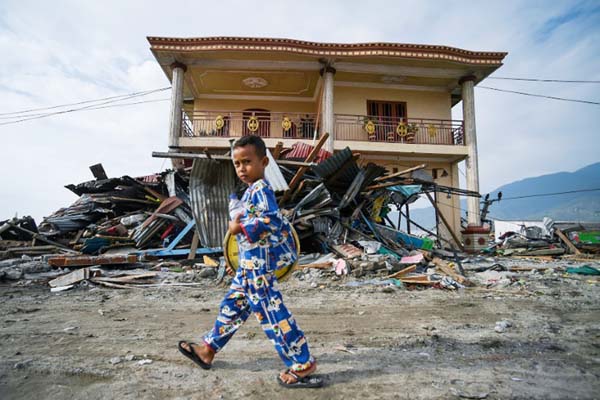
AFP, Indonesia :
Many children have been separated from their families and are “in shock and traumatised” following Indonesia’s devastating quake-tsunami, aid workers said Thursday, as much-needed supplies trickled in to shattered communities.
A total of 1,424 people have been confirmed dead and over 2,500 injured after the monster earthquake struck Friday sending destructive waves barrelling into Sulawesi island.
The disaster reduced buildings in the seaside city of Palu to rubble but, with transport links badly affected, aid has been slow to arrive and looting has broken out.
On Thursday, police armed with guns stood guard outside petrol stations to ensure order in long, winding queues. Trucks carrying supplies have reportedly been ransacked en route to Palu.
Authorities initially turned a blind eye but have now taken a tougher stance, with police rounding up dozens of suspected looters and the military warning that soldiers will fire on anyone caught stealing.
While rescuers continue to comb through destroyed buildings, hope is fading that anyone will be found alive under the rubble. Authorities say over 100 people are still unaccounted for.
Hundreds have been buried in mass graves as authorities race to avoid a disease outbreak from corpses rotting in the tropical heat.
‘Shock and traumatised’
At least 600,000 children have been affected by the quake, Save the Children said, with many sleeping on the streets among ruins.
Attention has focused on the huge number of children left orphaned, or separated from their families in the chaos as buildings collapsed across Palu and people were swept away by huge waves.
Aid organisations are urgently working with the government to identify and reunite them with their relatives, the group said.
“It’s hard to imagine a more frightening situation for a child,” said Zubedy Koteng, the group’s child protection adviser, who is in the city.
“Many children are in shock and traumatised, alone and afraid. Young children searching for surviving relatives will have witnessed and lived through horrific experiences which no child should ever have to see.”
The Indonesian government initially refused to accept international help, insisting its own military could handle the response, but as the scale of the disaster became clear President Joko Widodo reluctantly agreed to allow in foreign aid groups and governments.
Twenty-nine countries have pledged aid, according to Indonesia, but the delay in inviting help and severed transport links means little foreign help has arrived.
Trickle of aid
Palu airport-which was only accepting military flights in the early stages of the disaster-opened to commercial services Thursday but only a limited number, with aid workers given priority.
An Indonesian navy ship docked in the city Thursday carrying water, rice and food, which was loaded by soldiers onto trucks.
“We have to get to places where people need aid really quickly,” said first admiral Dwi Sulakson.
Desperate survivors, some crying, waited to get a spot on the vessel which was set to return to the city of Makassar in southern Sulawesi, and brief scuffles broke out with soldiers.
The United Nations has pledged $15 million from its emergency response fund. The Red Cross is dispatching ships loaded with supplies including field kitchens, tents, body bags and mosquito nets.

